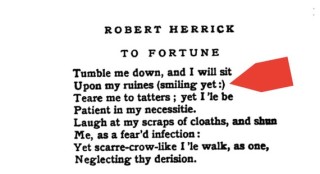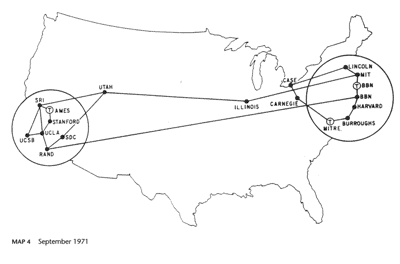SHOUTY CAPS!!!

Over at Meh Glenn Fleishman has put together a fascinating two-parter on the history of using ALL CAPS for emphasis. And SHOUTING.

Over at Meh Glenn Fleishman has put together a fascinating two-parter on the history of using ALL CAPS for emphasis. And SHOUTING.

It might just be random 17th Century punctuation, but this poem from 1648 certainly seems to be using a smiley face emoji.
(OK, it’s probably not intentional, but it’s lovely intersection of the emoji and the word.)
Many aspects of email are a lot older than you may think.
There were quite a few people in the early 1970s working out how to provide useful services using ARPANET, the network that evolved over the next 10 or 15 years into the modern Internet.
They used Requests for Comment (RFCs) to document protocol and research, much as is still done today. Here are some of the interesting milestones.
April 1971 [rfc 114]RFC 114 A File Transfer Protocol.[/rfc] One of the earliest services that was deployed so as to be useful to people, rather than a required part of the network infrastructure, was a way to transfer files from one computer to another. In the [rfc 114]earliest versions[/rfc] of the service I can find it could already append text to an existing file. This was soon used for sending short messages, initially to a remote printer from where it would be sent by internal mail, but soon also to a mailbox where they could be read online.
August 1971 [rfc 221]RFC 221 A Mail Box Protocol, Version-2[/rfc] had this prescient paragraph:
The arrival of my first spam email was a bit of a shock. I’d been on the internet for years by that point and had never seen junk mail in my inbox. Of course, the Internet was a very different place. The web was still a toddler. There was no email marketing industry. In fact, there wasn’t much commerce on the web at all. Much of the “surfing” I did was using gopher and ftp rather than the fancy new web browser called NCSA Mosaic. To share pictures we actually had to send printouts by postal mail.
It wasn’t just getting spam that was memorable (oh, great! now my inbox is going to look like my postal box, stuffed full of things I don’t want), it was the domain name: savetrees.com. Built into the domain name was an entire argument defending spam on the grounds of environmental friendliness. By sending spam instead of postal mail we could save the earth. Anyone who didn’t like it was morally corrupt and must hate the planet.
Why do I mention this history? During a discussion on a list for marketers earlier this week, multiple people mentioned that email marketing was clearly and obviously the much more environmentally sound way to do things. I mentioned this over on Facebook and one of my librarian friends (who was one of the people I was email friends with back in those early days) started doing her thing.
She posted her findings over on the Environmental News Bits blog: The comparative environmental impact of email and paper mail. It’s well worth a read, if only because a lot of companies have really looked into the issue in great detail. Much greater detail than I thought was being put into the issue.
I shared one of the links she found, the 2009 McAfee study, with the email marketing group discussing the issue. (You may want to put down the drinks before reading the next line.) It was universally panned as marketing and therefore the conclusions couldn’t be trusted.
Anyone who pays any attention knows that nothing we do and none of the choices we make are environmentally neutral. Plastic bags were supposed to save trees from becoming paper bags, but turned into an environmental mess of their own.
Simple slogans like “email saves trees” might make marketers feel better, and may have gained Cyberpromo a strong customer base in the early days. But the reality is different.